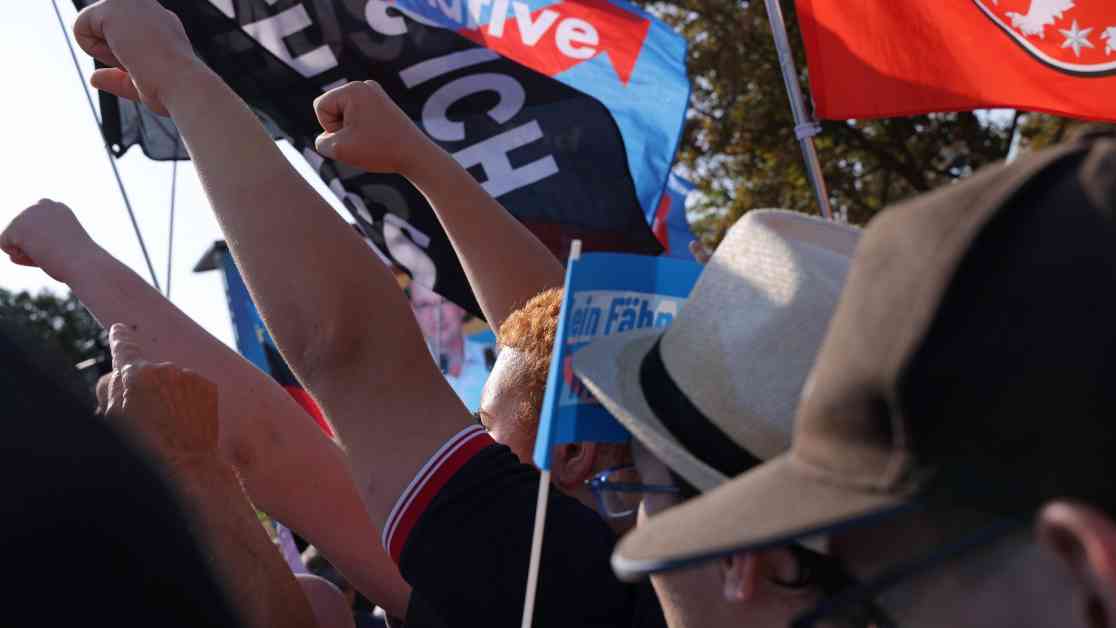In the heart of Berlin, a city steeped in history and haunted by ghosts of the past, a controversial figure stands at the center of a political storm. Beatrix von Storch, a senior member of Germany’s far-right Alternative for Germany (AfD) party, has surged into the limelight as her nation grapples with snap elections and a turbulent political landscape. But behind her political persona lies a complex family history that intertwines with the darkest chapters of German history.
A descendant of Lutz Graf Schwerin von Krosigk, a Nazi official who served as Hitler’s finance minister, von Storch is no stranger to the shadows cast by extremism. As we sit down for an exclusive interview not far from the infamous Berlin bunker where Hitler met his end, von Storch reflects on the weight of her family legacy. “One shouldn’t blame others for their ancestors,” she asserts, acknowledging the burden of history while charting her own course in the turbulent waters of German politics.
The AfD’s meteoric rise in the political arena has sent shockwaves through Germany, a nation grappling with economic woes and a series of tragic incidents involving migrants. The party’s anti-immigration stance has resonated with a significant portion of the population, drawing support from those disillusioned with the status quo. Against a backdrop of mass murders committed by failed asylum seekers and growing concerns over the integration of migrants, the AfD has positioned itself as a voice of dissent in a country struggling to come to terms with its past.
As the AfD’s popularity grows, so too does the scrutiny surrounding its members and policies. Germany’s domestic intelligence agency has labeled the party a suspected right-wing extremist group, citing inflammatory rhetoric and controversial statements made by its leaders. Bjorn Hocke, an AfD leader in Thuringia state, courted controversy by denouncing Berlin’s Holocaust Memorial as a “monument of shame,” while von Storch herself faced backlash over comments advocating for harsh border control measures.
The specter of history looms large over Germany, a nation scarred by its Nazi past and grappling with the legacy of war and genocide. Holocaust survivor Albrecht Weinberg’s decision to return his order of merit in protest against the rise of far-right sentiments underscores the deep wounds that still persist in the collective memory of the country. Against this backdrop of trauma and remembrance, von Storch navigates the treacherous waters of contemporary politics, grappling with the complexities of identity, guilt, and national pride.
But as the political landscape shifts and the winds of change sweep across Germany, von Storch remains steadfast in her convictions. While the AfD’s policies may evoke echoes of a bygone era, she insists that the present moment demands a nuanced approach to the challenges facing the nation. As Germany teeters on the brink of a new chapter in its history, von Storch’s words serve as a reminder of the fragile balance between reckoning with the past and shaping the future.
In the gritty streets of Berlin and the quiet corners of refugee shelters, the voices of those impacted by political decisions echo through the alleys and corridors of power. Syrian refugee Bashar Hassoun, once welcomed with open arms, now faces the specter of racism and uncertainty in a country torn between compassion and fear. As the AfD’s rhetoric gains traction among disillusioned voters, the plight of migrants and refugees takes center stage in a nation struggling to find its moral compass.
The road ahead is fraught with challenges and uncertainties, as Germany grapples with questions of identity, inclusion, and national belonging. Against this backdrop of turmoil and transformation, von Storch stands as a polarizing figure in a divided nation, her words carrying weight and consequence in a time of upheaval and introspection. As the dust settles and the votes are cast, the fate of Germany hangs in the balance, a nation torn between its past and its future.













